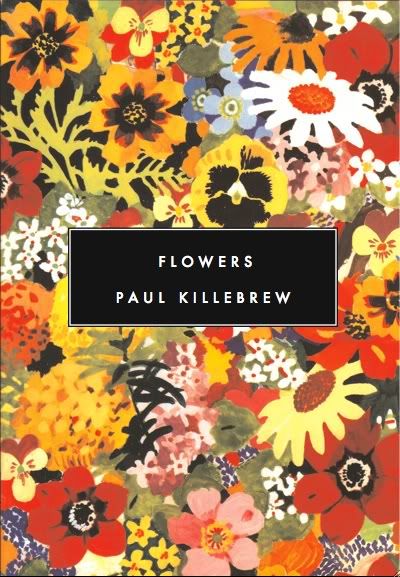
"Today I have lived wholly inside the drift from how I feel / to how others feel about me. I'd like to forget everything, / and then I do" (9) writes Paul Killebrew in the poem "Invisible Scoring," which appears near the beginning of his debut collection Flowers (Cranarium 2010). Killebrew's poems, and the collection in general, do indeed drift, so much so that we forget where we are located. Such drifting and forgetfulness, though, should not be interpreted as a pejorative assessment of the poems therein; instead, it becomes an aesthetic imperative to the extent that "it's not entirely clear that the poet exists" (6) in this flow of memory loss. True, the poet declares a "wish to be conscious / of myself," but must concede that "My frontiers are long and insecure," and thus he "cannot command them" (5).
Given this lack of self-knowledge, or at least an absolute self-definition, how does the poet navigate both the world and his poems? Killebrew proffers an answer, it would appear, in the humorously titled "John Fucking Ashbery": "Sometimes when I'm only a sense of myself, / I answer the phone and just breathe. The soul / coagulates behind the eyes and I think not / of the self in its dissolution" (11). Just breathe, the poet suggests, and stop thinking about the ever-deteriorating self. And that is what these poems do: breathe within an amorphous context of forgetting, which allows the poems, the poet, and the reader an opportunity to be "digested by time" in order for us "to lose thoughts or patterns of thought" (49).
It should be noted, though, that if these poems cause us to lose patterns of thought, it does not mean they are vacuous or meaningless. In fact, "meaning is always happening" (11); it's just that meaning, to some extent, is a function of the subjective mind: in all reality, "there's no message in the incidental," but nonetheless we "hear whatever message [we] listen for" (28). In other words, there are no master narratives, messages, or meanings, but there are local ones that form, deform, then reform throughout these poems. It should come as no surprise, then, that "The present forms of glory," which are those found within Flowers, "are much less indelible" (64) than those of days past.
Of course, in these less indelible, drifting, forgetful, and selfless poems, one may question whether or not we should care about a work of art that lacks authority, permanence, or stability. Killebrew worries little about these matters; in fact, he acknowledges that "I know that I'm at least barley relevant" (29). But what of what concern is relevance or glory when "It's not art if it feels important" (7)?
Given this lack of self-knowledge, or at least an absolute self-definition, how does the poet navigate both the world and his poems? Killebrew proffers an answer, it would appear, in the humorously titled "John Fucking Ashbery": "Sometimes when I'm only a sense of myself, / I answer the phone and just breathe. The soul / coagulates behind the eyes and I think not / of the self in its dissolution" (11). Just breathe, the poet suggests, and stop thinking about the ever-deteriorating self. And that is what these poems do: breathe within an amorphous context of forgetting, which allows the poems, the poet, and the reader an opportunity to be "digested by time" in order for us "to lose thoughts or patterns of thought" (49).
It should be noted, though, that if these poems cause us to lose patterns of thought, it does not mean they are vacuous or meaningless. In fact, "meaning is always happening" (11); it's just that meaning, to some extent, is a function of the subjective mind: in all reality, "there's no message in the incidental," but nonetheless we "hear whatever message [we] listen for" (28). In other words, there are no master narratives, messages, or meanings, but there are local ones that form, deform, then reform throughout these poems. It should come as no surprise, then, that "The present forms of glory," which are those found within Flowers, "are much less indelible" (64) than those of days past.
Of course, in these less indelible, drifting, forgetful, and selfless poems, one may question whether or not we should care about a work of art that lacks authority, permanence, or stability. Killebrew worries little about these matters; in fact, he acknowledges that "I know that I'm at least barley relevant" (29). But what of what concern is relevance or glory when "It's not art if it feels important" (7)?

Yeah, I bought this when it came out. Probably half the poems I liked; the other half I was kind of whateves on. There's a healthy amount of drifting, I agree. He has another one coming out on Canarium next year I think.
ReplyDeleteI really like this poem from Flowers:
http://www.gulfcoastmag.org/index.php?n=2&si=16&s=1091
My favorites are "Eponymous," "Kicking Corporate Ass in teh Foosball Arena," "Invisible Scoring," "John Fucking Ashbery," and "For Beth Ward."
ReplyDeleteI think my favorite is "I Am Such a Happy Little Girl," which has a typo in the book version, if I remember correctly.
ReplyDeletehttp://www.softtargetsjournal.com/v11/paul_killebrew.php